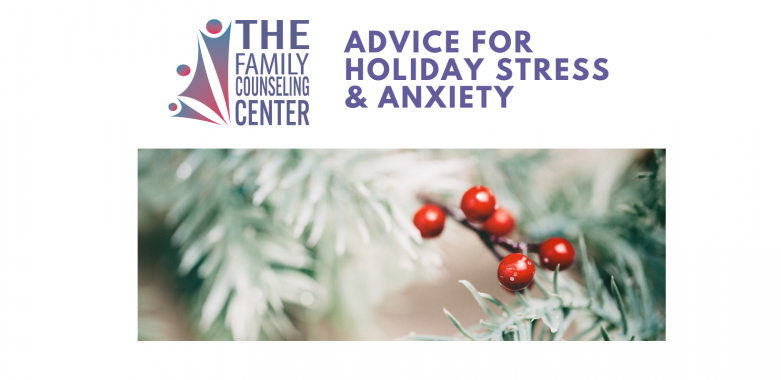Family Counseling Center Offers Advice on Dealing with Holiday Stress
The Family Counseling Center of Fulton County recognizes that even in the best of situations, the Holiday Season can bring stress, feelings of loneliness, and anxiety.
For some of us, the ability to enjoy the present is outweighed by that emotional strain. Daniel Mossel, LMHC, a therapist at The Family Counseling Center provides tips and techniques to deal with difficult emotions during the holidays.
The most common feelings during the Holiday Season are loneliness, sadness, and in some cases – anger.
1. In each situation it is important to identify your emotion and ask if that feeling is supported by the facts in front of you. “Is your anger due to something that is happening in this moment or in the past?” asks Mossel. “Is it due to a serious act of malice or was it an accidental action or moment of inconsideration? Is it worth your ability to not enjoy the moment with your family?” If your emotion doesn’t fit the facts then Mossel suggests focusing on releasing the anger and tension from your body. Relax your fists, unclench your jaw. “These actions will not completely release the anger but it will help lessen the feeling. Anger is something you can actively make more of if you focus your energy on it – but by actively changing your body, breathing and posture you can begin to let some of that anger go instead of grow.”
2. If you are overcome by loneliness or sadness it is important to seek out either company or activities. “Similar to anger, feeling lonely can create a deeper sense of loneliness,” says Mossel. “Loneliness makes you want to withdraw and reaching out – even by just making a phone call – can be scary and difficult. But the opposite of sadness isn’t happiness, it is reaching out and making connections with people.”
Mossel suggests four ways to seek out the opposite of sadness:
- Get active – find an activity that brings you pleasure such as doing a puzzle, reading a book you used to love, or getting outside for a walk or to sit in the sunshine.
- Avoid avoiding – reach out to loved ones, friends, or even acquaintances you know from your everyday life. You can make a phone call, make a time to visit or have them visit. Avoiding the desire to remove yourself may be as simple as going shopping and simply enjoying the moment of being around other people – even if they are strangers.
- Build mastery – do things that make you feel competent and self-confident. It can be as simple as baking an amazing dessert or as complex as learning a musical instrument, if you have a success recognize it and appreciate your ability.
- Increase pleasant events – find moments of pleasure in your life no matter how big or small. Pleasure can be found in a single moment like walking down Main Street and looking at holiday displays in the windows or as large as going to a concert to listen to music that you love.
“Sadness and loneliness can sometimes make us focus on the past,” adds Mossel. “Finding ways to stay in the present and identify the pleasure and joy in the now is an important way to move through the sadness. If you receive a compliment, don’t bat it away as we so easily and often do. Accept and enjoy what someone has said. And, if you really want to work on doing the opposite try giving compliments. Doing nice things for others can help us feel better.”
3. Practice grounding techniques.
Grounding techniques are small actions you can take to return to the present and focus on what is in front of you rather than the anxiety or emotion you are feeling. “Grounding techniques can be simple and do not need to always be meditation,” says Mossel who suggest three ways to ground yourself:
- Be mindful – look around and focus on your environment, noting each detail as it unfolds. How does the curtain look with the sun coming through it? How does the snow smell as it falls? How do the leaves sound as they rustle in the breeze? Being mindful of your environment can help you to be in the present moment and enjoy the people and activities around you.
- Change your posture – adopting a “bright” posture can actually affect how we feel. Sitting up straight, keeping our eyes wide and bright, and smiling can help us feel better. “Don’t forget about your breath,” adds Mossel. “Breathing is a part of posture too.”
- Change your body chemistry – through physical movement or touch. “Drinking something cold and concentrating on how it feels can take us away from our moment of anxiety and focus our body on something else.”

